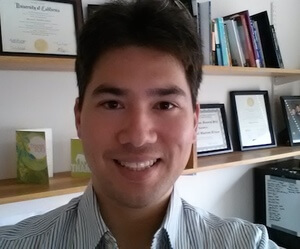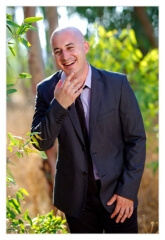 |
Director: Michael W. Kraus |
| Michael is an Assistant Professor at the Yale University School of Management. Michael studied psychology and sociology as an undergraduate at the University of California, Berkeley, where he also received his PhD in social-personality psychology. Michael’s interest in the emotional dynamics of social interactions arose out of his training in nonverbal behavior coding (at UC Berkeley) and psychophysiological assessment (at UC San Francisco), and from his general curiousity about social life. Michael’s primary lines of research involve the psychological underpinnings and consequences of social hierarchy (e.g., power, class), social and relational aspects of the self, and the functions of emotion expressions.
E-mail: mwkraus(at)illinois.edu Vita: |
 |
Graduate Student: Bennett Callaghan |
| Bennett Callaghan is an incoming doctoral student in Social Psychology at the University of Illinois at Urbana-Champaign. He received his BA in Forensic Psychology from John Jay College of Criminal Justice in 2012. Continuing the interests he developed as an undergraduate, Bennett hopes to investigate human beings’ values, morals, and ideas of justice. More specifically he hopes to focus on their importance in social interaction and the effects of hierarchical or situational social factors (e.g. social class, high-power vs low-power), culture, and personality on their expression. He also has a related interest in the priming of such values.
E-Mail: bennett.callaghan(at)gmail.com |
 |
Graduate Student: Jacinth Tan |
| Jacinth is a doctoral student in Social Psychology at the University of Illinois at Urbana-Champaign. She completed her undergraduate degree in Psychology at the National University of Singapore with a B.Soc.Sci. (with Honors). Jacinth’s primary research interest lies in attitudes and persuasion, in particular how persuasive communications can be tailored to interact with specific goals and individual differences and impact persuasion in a variety of domains (e.g., promoting a cause, healthy behaviors). Motivated by her growing interest in understanding the psychology of the lower class, Jacinth has started exploring how social class shapes one’s response to persuasive communications.
E-Mail: jjtan2(at)illinois.edu |
 |
Graduate Student: Noam Segal |
| Noam is a graduate student in Social-Personality Psychology at the University of Illinois at Urbana-Champaign. He completed his undergraduate degree in Psychology and Communications at the Interdisciplinary Center in Herzliya with a B. A. (with honors). Noam’s primary research interest lies in exploring close relationships, in particular the dynamics that determine the quality and functioning of romantic relationships. In addition Noam is interested in the ways in which our relationships and attachment figures interact with our decision making processes, and issues related to attraction, sexual behavior and intimacy.
E-Mail: nsegal3(at)illinois.edu |
 |
Graduate Student: Pete Ondish |
| Pete Ondish is a doctoral student in Social Psychology at the University of Illinois at Urbana-Champaign. He completed his undergraduate degree in Biology at Allegheny College. Pete’s primary research interests are related to 1) working and middle class cultural differences in identity, agency, and interpretations of ambiguous social phenomena such as choice, and 2) how cultural differences in language affect information processing and academic motivation, particularly in STEM fields.
E-Mail: prondish(at)gmail.com |
 |
Graduate Student: Erika Salomon |
| Erika is a doctoral student in Social Psychology at the University of Illinois at Urbana-Champaign. She completed her undergraduate B.A. in English at the University of Maryland and her M.A. (distinction) in Cognition and Culture at Queen’s University Belfast. Erika is primarily interested in how people understand and explain the world, especially in how cognitive processes influence religious and scientific attitudes.
Website: mwkraus(at)illinois.edu Twitter: ecsalomon |
 |
Undergraduate Honors Thesis Student: Amy Kim |
| I am interested in close interpersonal relationship (both romantic partners, group in work place, family, friends,etc) and emotion (specifically in positive psychology),such as how the intensity and the frequency of interaction leads to positive affect. I am also interested in mental well being and life satisfaction, (overcoming) stress, optimism. My interest comes from general curiosity about social life and relationships between people and their formation. I am also motivated to study positive psychology and optimism, and its effect on the self and social interaction. |
 |
Undergraduate Honors Thesis Student: Hannah Swoboda |
| Hannah is an undergraduate student in psychology at the University of Illinois at Urbana-Champaign. She has a diverse range of research interests and plans to complement her future social psychology research with neuroscience. Hannah is interested in topics such as motivation, prosocial behavior, attitude change, and the neural substrates of these phenomena. A major goal of her research is to find ways to promote egalitarian values in our society. |
 |
Undergraduate Project Coordinator: Jennifer McLean |
| Jenn is a senior majoring in Psychology at the University of Illinois Urbana-Champaign. Her interest for psychology sparked from both a general curiosity about behavior and after learning about The Invisible Gorilla study in a high school class. Since then, her interests have grown to include the dynamics of romantic relationships and attachment, the influence of social hierarchy on stress responses and emotion, and the personality psychology of leadership in business. |
 |
Undergraduate Project Coordinator: Ziang Xiao |
| I am a junior majoring in Psychology at University of Illinois. My interest lies in the area of social psychology. The curiosity of the formation of social status motivates me in the area of social psychology. I am interested in how people in different social status interact with others in various domains. My current research topic is about people’s prosocial behavior online. I want to explore my interest in the next few years by conducting my research in social status, culture and social development. |